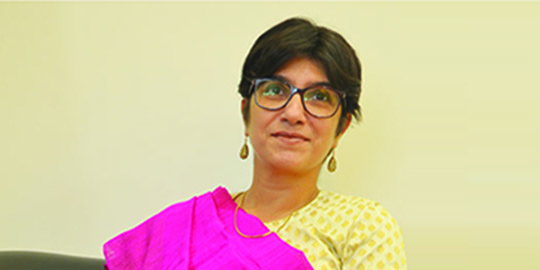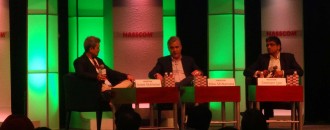
Juggling With Elan
Huzan started her career with ICICI Securities, moved on to JP Morgan and takes care of business growth at NSE's forex & debt markets. Today she's a name in the currency and capital markets. But for her, the road's not half-covered yet!
Vanita Peter D'souza | March 2016 Issue | The Dollar Business
Huzan joined National Sock Exchange (NSE) in 2008 and it was not just about changing organisation for her. Joining NSE transformed her career path, entirely. At JP Morgan, her former employer, she was merely heading the trading desk but at NSE, she is today the Head of Business Development – Currency & Debt markets.
Huzan started her career way back in 1993 with ICICI Securities (I-Sec), a joint venture between JP Morgan and ICICI. In 1998, when the I-Sec spilt happened she moved with JP Morgan. And then almost a decade later, NSE happened to her. "The transition from over-the-counter (OTC) markets to a stock exchange, of course, was difficult but thankfully, NSE is a supportive employer," says Huzan. Her 'never give up' attitude, ability to work hard, and change things for the better has brought her where she is today. Huzan believes in seeking challenges and paving her own path.
She is a mother, a daughter, a wife, a daughter-in-law among the multiple roles she adorns. And she attributes her success to her family, particularly her husband. She laughingly tells The Dollar Business that she is able to manage all this with ease because of her husband but he can’t take all the credit. "After all no one can replace a mother," she says with a smile. She feels that she has made some right choices in her life and that to an extent has helped her in managing the work-life balance.
Apart from managing a family and a career, she is also a trustee in Sujaya Foundation. Sujaya provides education to the under-privileged by incorporating the best pedagogical practices at not just elementary level but even at advanced level. Sujaya Foundation attempts to bridge the gap for its students between education and employment. For Huzan, education is the key to upgrade these children and hence, Sujaya took form.
Earlier, before becoming a mother, she spent most of her time with Sujaya. But with time and extra responsibilities on her shoulder she spends little time with foundation. However, if at all the foundation needs her she works from home. On education Huzan says, "There is a saying, buy someone a fish, you feed for a day. You teach someone to fish, you feed him his life”. She believes education gives people an opportunity to fulfill their potential and make a decent living for themselves. Her advice to youngsters: "Take control of your life and pursue your dreams!"
TDB: Please take us through your professional journey.
Huzan Mistry (HM): I started my career with ICICI Securities, which at that point of time was a joint venture of ICICI and JP Morgan. When the split happened between the two, I moved with JP Morgan and joined their interest rate and foreign exchange department (IRFX). I spent about two years with JP Morgan. I quit JP Morgan to join the National Stock Exchange (NSE) in 2008. The profile with NSE was very different as I used to run the trading desk in JP Morgan, while I had joined NSE to start currency derivatives. I had no direction with exchanges as we used to deal with the OTC (over-the-counter) market. The transition was not difficult. It was a beautiful learning experience. NSE is very open and welcoming. It was of course challenging but not difficult.
TDB: What is more difficult – managing the NSE’s currency market or your family?
HM: It is a challenge. There is no taking away with the fact that heading NSE’s IRFX market and being a mother is a difficult balancing act. I think I am quite fortunate as my family is very supportive. Fortunately, my husband is always there and is almost an equal contributor to make my task easy. I’m not saying equal because a mother’s job is a mother’s job. However, we have managed very well with sharing parenting. But yes, at times, I do ask myself – am I doing justice to both the roles? It is all about the choices you make and I chose to try and find a balance. Moreover, to be honest, NSE has always been a supportive employer, in terms of understanding that you will do more or less and there will be ups and downs.
TDB: You are also involved with the Sujaya Foundation. How has the experience of working with underprivileged children been?
HM: Before my parenting phase, I used to spend more time with Sujaya. Truly, I spend less days these days. I’m involved with Sujaya even though I’m not physically present always. I am one of the trustees of the foundation and now we have a team to take care of it. As and when required, I work from home. I have always been interested in the field of education.
TDB: The Fed has hiked its rates after a long period of near zero rates. Do you expect this to have an impact on India. What has been the impact on Interest Rate Futures (IRF)?
HM: Frankly, US has been in a quantitative easing phase. India, on the other hand, has been on declining interest rate cycle because, presently, we are trying to conquer inflation. Given that, Indian and US interest rate cycles are not aligned. But the fact, that US has raised rates will have an impact on the world, including India. The world’s reserves are with US Treasury. We have seen some impact of the rate hikes in our oreign exchange market and equity market.
TDB: How has the volatility of the currency markets impacted the bond markets in India?
HM: Bond markets have been lacklustre and dull for the past few months. We have seen much more volatility in equity and currency markets. However, the volatility didn’t have much impact on the bond market. Yes, there is an impact on hedging and exposure. And there is FII outflow but there are other factors that are impacting the interest rate market.
TDB: Do you think the devaluation of Chinese yuan will affect the Indian rupee?
HM: What is happening with the yuan is a reflection of what is happing in the Chinese economy. And what is happening in China is going to affect the whole world as they are the manufacturing hub to the world. They are also one of the biggest investors in the world. They are big trading partners to the world. So, given all that I cannot tell how the yuan is affecting the rupee but the Chinese economy is affecting the world. And definitely, it will impact India as it is considered an emerging market.
TDB: In Asian markets we have seen some amount of competitive easing in a bid to capture export markets. How do you expect the RBI to react?
HM: I think the RBI is obviously doing its job in terms of managing the currency and the interest rate. Their focus has always been keeping the economy in check and they will continue to do that. I don’t think that policies are here to define a level for a rupee. We are a free market and we do not decide if the rupee has to be 65 or 70 or 68 against the dollar. They do try and limit the sudden impact of inflow-outflow. Where India is concerned we are still seeing rate cuts. Inflation is where it is and our cycle is slightly different than rest of the world. If US is increasing rates that does not mean we are going to raise rates and keep inflation out of the picture. 
TDB: In recent months, there has been much talk about capital flight from Indian stock markets. What has led to such negative investor sentiment amongst FIIs?
HM: There are two parts. Firstly, what is expectation of the world and what is the global economy going to deliver. And I have talked enough of the world. Now all depends on the Union Budget. So, it is going to be a function of what has India delivered and what it is expected to deliver in line with opportunities in the rest of the world. Also, sometimes what happens with an investor is that he might want to reduce his exposure in an emerging market and India is an emerging market.




 to success.
to success.